Selling Afghan stitchery in Germany
Afghanistan has seen violence for years and many of the women and children in the war-stricken country lack the education to get good jobs and put enough food on the table. That’s where Zhora Comes in, a young Afghan woman living in Germany. Her plan to help the women in her home country is making Germany’s fashion more colorful.
Listen to the report by Falk Steinborn in Siegen, Germany:
Somali activist campaigns against female genital mutilation
The UN has called it a human rights violation; but the practice of cutting the sex organs of young girls and women, also known as female genital mutilation – or FGM – is still practiced on girls around the world. Until recently, governments have been unwilling to engage with the issue because it is deeply rooted in the culture that practice it. However, more and more women are speaking out about the practice in a bid to stop it for good.
One of them is Muna Hassan, a young Somali woman born in Sweden and raised in Britain. Despite extreme opposition to her cause, she is campaigning against the practice of FGM.
Listen to the report by Lyndsey Melling in Bristol:
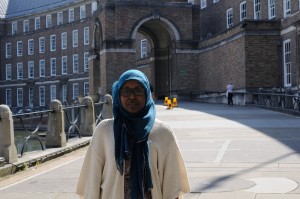
Muna’s family is Somali but she was born in Sweden and moved to the UK when she was 9 years old, where she grew up in a diverse community in Bristol (Photo: Lyndsey Melling).
Soccer gives refugees in San Diego a chance
For many refugee children, attempting to adapt to life in the US can be challenging. Language barriers, cultural differences and post-traumatic stress disorder are all obstacles to overcome on the road to resettlement.
But one young recent graduate from San Diego is attempting to make life a little easier for refugees – through soccer. Twenty-six-year-old Mark Kabban’s soccer program, Yalla, has proven to be a huge success with over 200 children participating since it was founded in 2009.
The project makes the most of the children’s enthusiasm for soccer to improve their prospects in education and work, granting them an opportunity to succeed.
Listen to the report by Mischa Wilmers in San Diego:
Soccer gives refugees in San Diego a chance
More on YALLA’s website.
(first published August 20, 2013):
LGBT activist promotes respect in Parisian schools
When Gary Roustan visits school classes in Paris, he’s the first gay person some of the students have met. As the president of an LGBT organization, he’s fighting homophobia – a year after France legalized gay marriage.
Over the past year, he and other members of the organization haven been invited to speak to students in 128 different high schools about what it means to be lesbian, gay, bisexual or transgender.
Listen to the report by Fabien Jannic-Cherbonnel in Paris:
Upcycler in Nigeria weaves colorful livelihood
Do you know what happens to the leftover fabric when your clothes are made? Esther Uwem Etim, 25, from Nigeria wanted to keep valuable materials from going to waste, so she started collecting unused textiles and turning them into beautiful rugs.
As part of the Village Weavers Project, Esther doesn’t upcycle by herself. She’s trained more than 100 low-income women to make the rugs, which are now being sold all over the world. The project isn’t just good for the environment, it provides a livelihood to those in need.
Listen to the report by Nonye Aghaji in Abuja, Nigeria:
Saving France’s beaches from a plastic invasion
About five years ago millions of mysterious plastic pieces started appearing on France’s beautiful beaches. They were filters from nearby water treatment plants, where they play a useful role. But when the treatment plants overflow, the plastic filters escape and end up polluting the environment.
One 25-year-old Frenchman heard about the plastic invasion and decided to help protect the coastal environment. As a volunteer with the Surfrider Foundation Europe he’s been picking up as many plastic pieces as he can find. And that’s not all – he’s on a mission to find out where exactly these filters are coming from to hold the polluters accountable.
Listen to the report from Charlotta Lomas in La Teste-de-Buch, France
(first published October 29, 2013):
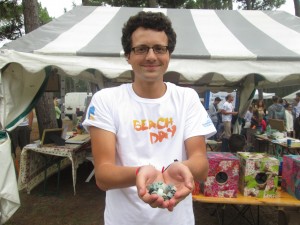
Charleric Bailly is not only picking up as many plastic filters as he can find on France’s beaches but also tracking down the sources of plastic pollution. (Photo: C. Lomas)
Rebuilding houses in the Philippines
Typhoon Haiyan devastated the Philippines last November. It was one of the strongest storms ever to make landfall, and in the Philippines it was the deadliest typhoon on record. More than 6,000 people lost their lives, and millions were left homeless.
27-year-old Maria Lukowska was in Warsaw working as a lawyer when she first heard about the disaster, and decided to help the typhoon’s victims. Two weeks later she flew to the Philippines to work as a volunteer and until today she’s still on Bantayan Island organizing aid logistics, health care, and new shelters for families.
Listen to the report from Magdalena Fijalkowska, Bantayan Island, Philippines
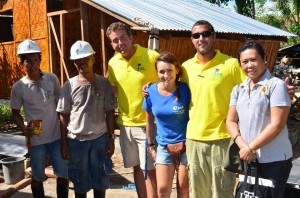
Maria Lukowska says that she and the volunteer crew “have managed to distribute over 188 sets of construction materials for the families” (Photo: Maria Lukowska)
Saving Germany’s midwives
Going into labor can be an anxious time, especially for first time mothers. In Germany, it’s often the midwife who provides support and helps young women get through the ordeal.
Bianca Kasting, 32, knows this well enough. Last year, when she gave birth to her first child, a midwife was there to hold her hand.
In Germany there are around 21,000 midwives. And although the work they do is vital, they are often underpaid, and have to pay high insurance premiums. The situation has become so bad, that many midwives have joined protests around the country, or left the profession entirely.
Bianca wanted to do something to help, so she launched an online petition, and even cycled around Germany – her baby in tow – to raise awareness about the plight of midwives.
Listen to the report from Michael Hartlep, Germany:
Fighting cancer with dreadlocks
Kelly Dortmands has spent a decade growing her meter-long dreadlocks, but now she’s planning to shave them all off. She’s not doing it to change her look or to make a fashion statement. The 32-year-old is shedding her 53 dreads for a good cause – to raise money for cancer.
Cancer is currently the number one cause of death in the Netherlands. Kelly has seen it affect the people close to her, including her mother and her friend.
Kelly wanted to do something to help. She’s hoping to raise 5300 euros – 100 euros per dreadlock – for the Dutch Cancer Fund.
Listen to the radio report by Laura Postma in Den Bosch, Netherlands:
On two wheels out of poverty
Johannes Wolf from Germany is passionate about cycling, but he knows that bikes aren’t just a good way to get some exercise. In developing countries they can be crucial to running a small business and delivering goods. So he decided to start collecting used bikes from all over Germany in order to repair them and then ship them to African countries where they can be put to good use.
Listen to the report from Gaia Manco and Ronny Arnold in Dresden:
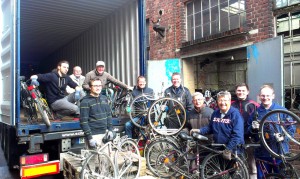
Johannes (left, standing) and his team in front of a container used to shipping bikes to Ghana. “Bikes for Africa” already shipped around 800 bikes to Ghana this year alone (Photo: Ronny Arnold)
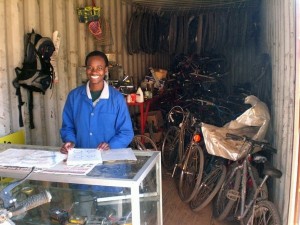
Once the container reaches its destination, it is often transformed into a bike shop and repair station (Photo: Ronny Arnold)
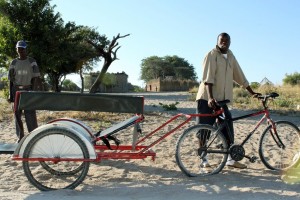
Nurses and doctors can now reach more patients in a day than they would do on foot. In case of an emergency, a bike can turn into an ambulance (Photo: Ronny Arnold)
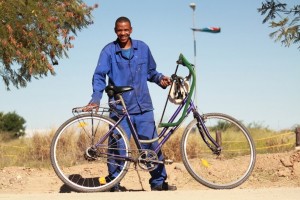
Mr. Howecka (pictured above) is a gardener. He used to walk, but according to Johannes Wolf now the bicycle is his business vehicle. He can reach more customers and take clients who live farther away (Photo: Ronny Arnold)
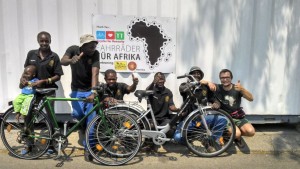
Johannes tries to visit one bike project a year. Here he is in Namibia, where he got the idea to start the project “Bikes for Africa” in the first place (Photo: Ronny Arnold)



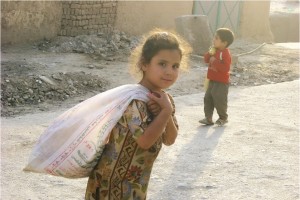
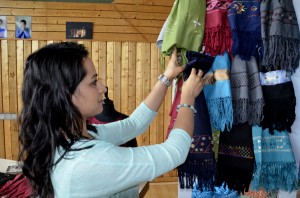
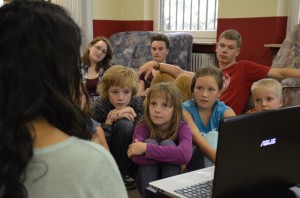

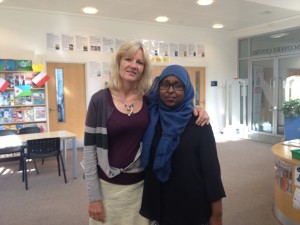
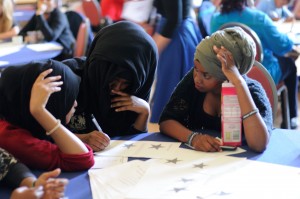

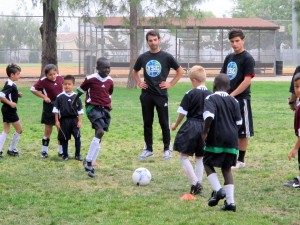
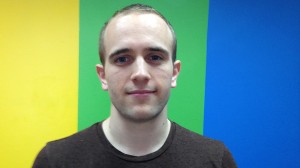
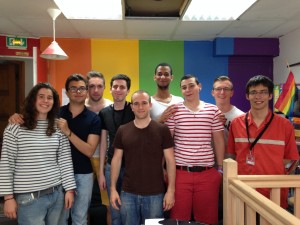
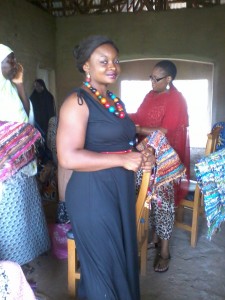
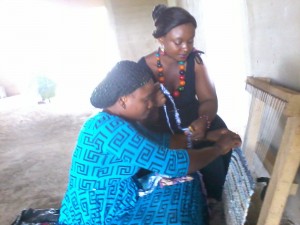
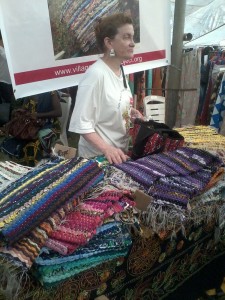
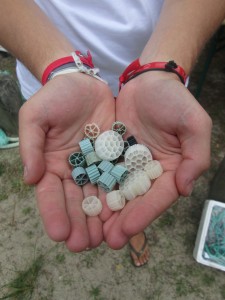
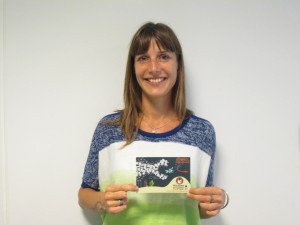
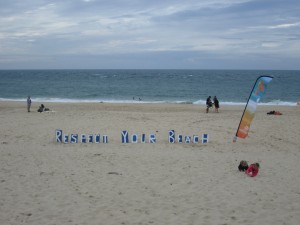
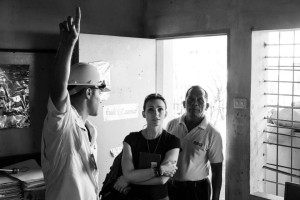
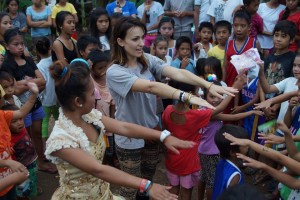
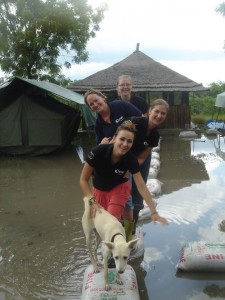
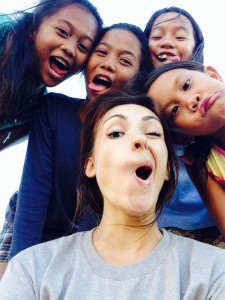
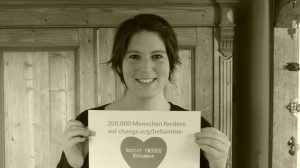
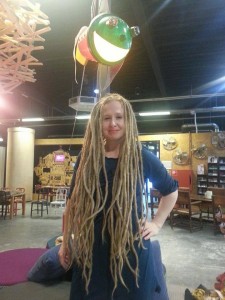
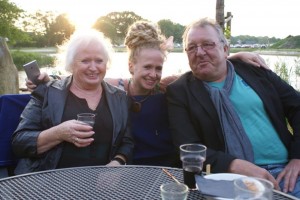
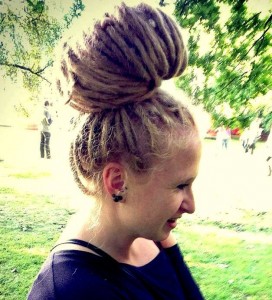




Feedback